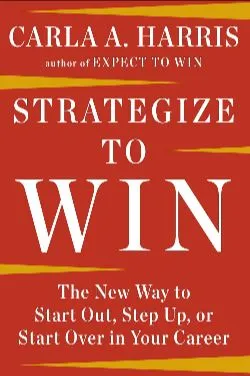
I think this book is likely to be interesting to those who are far more involved in the professoinal world than I am, especially those in large companies. Carla A. Harris offers a guidebook to developing your career, especially with a mind to promotion and climbing up the corporate ladder.
In her anecdotes, I had the distinct sense that Harris’s primary experience is in larger workplaces with many departments. “Should I enter the sales department? Finance? Marketing? What positions did most C-Suite executives have before their current position?”
I come from an educational and non-profit background, so the text of this book was really illuminating to me. Especially in mainstream education, career progression tends to be fairly straight-forward. If in higher education, most begin as an assistant professor (should they be fortunate enough to find themselves in a tenure-track appointment). They then rise to associate professor after tenure, and finally full professor. Those who are more ambitious have the opportunity to become a dean and, from there, find their way into some other administrative appointments.
The same trajectory is true in K-12 education. A teacher is hired, then they can gain tenure, ensuring job security. If they choose, they can rise to become dean, an assistant principal, the principal, and–for the most fortunate–superintendant of a district.
The professional world is far messier. Job titles change from company to company, and Harris urges us to think about career progression before taking a new job. If those in marketing face a hard ceiling at a certain point, it’s best to steer clear (or prepare for an exit by looking at competing firms). More importantly, it is absolutely crucial to keep up with compensation, as your salary is an easy-to-interpret code for your worth. I suspect that this is more true of the private sector than the public sector or non-profit worlds, although refusal to fight for higher salary in a non-profit may be read negatively in other workplaces.
Harris argues that there are two forms of currency that we rely on in our professions: performance currency and relationship currency.
We build our performance currency when we do our jobs well, limit our mistakes, and make up for errors with new life on our work. Our performance currency is especially valuable when we frequently go above-and-beyond what is expected of us. When people say that they want their work to speak for itself, they are building their worth on their performance currency.
Unfortunately, performance currency is not enough. You could do the most outstanding job, but never be taken notice of. Our relationship currency is all about our network, our ability to play politics in the workplace, and is fundamentally about being well-connected to the movers and shakers of the industry. Work is competitive, and a worker without allies is sure to fall behind those who do.
These two forms of currency (of which relationship currency seems to be more important) are what allow us to develop our careers. We can call in favors or say, “I deserve a promotion because I effortlessly managed a portfolio of $10 pentillion. If you don’t believe me, you can ask the CEO of Google and the CFO of Blue Cross Blue Shield.” Obviously, the exact quote is a joke, but this sort of claim is what allows us to rise.
Harris rightfully points out that we won’t be able to work effectively in jobs that are at odds with who we are. She identifies a few different profiles: “the good solider,” “the yes man,” “the arguer,” etc. Knowing how we fit into a given organization is important to leaning on our own strengths.
All of these profiles are important to a functioning workplace, although some will find greater difficulties in changing circumstances. The arguer, for example, is really important in an organization developing cutting edge projects, as s/he can point out the limitations and failings of them. On the other hand, the arguer is much less likely to succeed when a manager is insecure and is worried about competition and/or criticism.
I’ve learned a lot from this book, especially because a lot of the content here was foreign to me. It was a great way of making sense of systems and networks in an unfamiliar world, and I suspect that it will be a great tool as I enter the next chapter of my life.